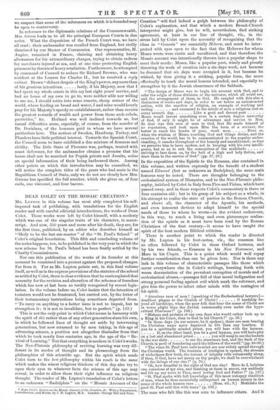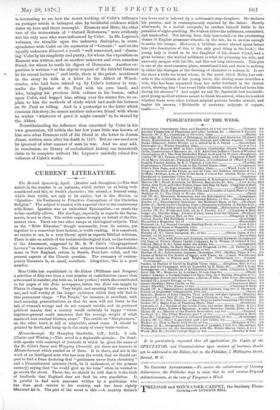DEAN COLET ON THE MOSAIC CREATION.*
MR. Lurrox in this volume has most ably completed his self- imposed task of publishing, with translations for the English reader and with careful editorial introductions, the works of Dean Colet. These works were left by Colet himself, with a modesty which was one of the singular traits of his character, in manu- script. And now, 350 years and more after his death, they are, for the first time, published, by an editor who describes himself as " likely to be the last sur-master " of the "St. Paul's School" of Colet's original foundation. This fifth and concluding volume of the series happens, too, to be published in the very year in which the new scheme for St. Paul's School has been finally settled by the Charity Commissioners.
Nor can this publication of the works of its founder at this moment be construed into a protest against the proposed changes. Far from it. For as Mr. Lupton points out, in this final volume itself, as well as in the express provisions of the statutes of the school as settled by Colet, there is clear evidence that he contemplated that necessity for the revision and alteration of the schemes of founders which has now at last been so tardily recognised by recent legis- lation. in the volume before us, Colet insists that the intention of testators would not be frustrated, but carried out, by the letter of their testamentary instructions being sometimes departed from. "To carry on anything to a better issue is not to impair, but to strengthen it ; it is not to invalidate, but to perfect." (p. 113.) 'Phis is not the only point in which Colet seems in harmony with the spirit of this rather than of any other generation since his own, in which he followed lines of thought set aside by intervening generations, but now returned to by men taking, in this age of advancing science, a position not altogether dissimilar from that -which be took nearly four centuries ago, in the age of the "Re- vival of Learning." Not that everything is modern in Colet's works. The Neo-Platonic philosophy of reviving learning was very dif- lerent in its modes of thought and its phraseology from the philosophies of this scientific age. But the spirit which made Colet turn to the best philosophy within his reach is the same which makes the wisest religious thinkers of this day also try to open their eyes to whatever facts the science of this age may reveal, in order to allow them their right influence on religious thought. The reader of Mr. Lupton's translation of Colet's letters to an unknown " Radulphns " on the "Mosaic Account of the
• Dean Colets Letters on the Mosaic Account of the Creation, ke. With a Translation, Introduction, and Notes, by I. H. Lupton, MA. London: George Bell and Sons.
Creation" will find indeed a gulph between the philosophy of Cold's explanation, and that which a modern Broad-Church interpreter might give, but he will, nevertheless, find striking agreement, at least in one line of thought, viz., in the stress laid by Colet upon the necessity of recognising that the ideas in " Genesis " are essentially Hebrew, and must be inter- preted with eyes open to the fact that the Hebrews for whom Moses wrote were rustic and uncultured, and that therefore the Mosaic account was intentionally thrown into a popular shape to meet their needs ; Moses, like a popular poet, wisely and piously throwing the work of creation into a six-days work, not because he dreamed that six days were occupied in it, but because he wished, by thus giving it a striking, popular form, the more effectually to teach the moral lessons intended, and especially to strengthen by it the Jewish observance of the Sabbath.
"The design of Moses was to begin his account with God, and to refer the origin of those divisions of the universe, which all could see, and the arrangement of them, to God. He coupled with this also a distinction of works and days, in order to set before an uninstructed nation, with the sanction of religion, an example of working and
resting and commend to the minds of men a religions rest on
every seventh day Like a good and devout poet Moses would invent something even in a certain degree unworthy of God, if only it might be of advantage and service to Man. So dear was this race of man to God, that He made himself of no reputation, and took upon Him the form of a servant, the
better to reach the hearts of poor, weak men Even so, when the wisdom of Moses, touching God and things divine, and the creation of the world, has to be communicated to the popular under- standing, it smacks throughout of the homely and uncultivated; so that we perceive him to have spoken, not in keeping with his own intelli- gence, but so as to suit the conceptions of the multitude striving to lure them on, by the bait of a high and holy fiction, and draw them to the service of God." (pp. 27, 28.)
In the exposition of the Epistle to the Romans, also contained in this volume, and written expressly for the benefit of a student named Edmund (but as unknown as Radulphus), the same main features may be noted. There are thoughts belonging to the ecclesiastical system of Dionysius, and to the Neo-Platonic philo- sophy, imbibed by Colet in Italy from Pico and Ficino, which have passed away, and in these respects Colet's commentary is three or four centuries old ; but in his grasp of his subject as a whole, in his attempt to realise the state of parties in the Roman, Church, and above all, the character of the Apostle, his methods, and even innocent devices to adapt himself to the special needs of those to whom he wrote—in the evident endeavour, in this way, to reach a living and even picturesque realisa- tion of the epistle as it must have been read by the Roman Christians of the first century—it seems to have caught the spirit of the best modern Biblical criticism.
There is another point to which the reader is directed by Mr. Lupton in his foot-notes, viz., the common line so often followed by Colet in these Oxford lectures, and by his two friends, — Erasmus in his New Testament, and More in his Utopia. This is a point which would well repay further consideration than can be given here. Nor is there any lack in this volume of characteristic passages like those which occur everywhere else in Colet's writings, bursting forth with warm denunciation of the prevalent corruption of morals and of ecclesiastical abuses,—passages full of that moral indignation and strong personal feeling against evil which mark the reformer, and give him the power to infect other minds with the contagion of his spirit.
"Atrocious race of men [speaking of the Ecclesiastical lawyers]— deadliest plague to the Church of Christ' 0 hardship be- yond all hardships, when the poor folk that bear the name of Christ are in worse plight than the Jewish commonalty even under the hypo- critical Pharisees !" (p. 163.)
"Bishops and prelates of our own days who would rather look up to a King in his Court, than to God in his Church (p. 59.) "In these days (to our sorrow, be it spoken), there are men bearing the Christian name more depraved in life than any heathen. If you be a spiritually minded priest, you will bear with the layman.
If, on the other hand, you be a good layman, you will have pity
on a lost and abandoned priest you will weep to see the leaders in the war slain to see the steersman lost, and the bark of the Church in peril of foundering amid the billows of the world." (pp. 88-90.) "The vices St. Paul here calls to mind are now widely spread through the Christian world. The fountain of irreligion is opened, the streams of wickedness flow forth, the torrent of iniquity rolls vehemently along. If thou, 0 God, have not mercy on thy people, we shall be overwhelmed with the 'deluge of our sine!" (p. 70.)
"Oh, how dreadful in the sight of God are sins ! Here do I, helpless one, conscious of my eine, and blushing at them in secret, crv suddenly and lift up my voice to Thee, most loving God and Father!" (p. 127.)
"St. Paul spoke with full knowledge of this most unhappy condition of man when he thus mournfully soliloquised on human misery in the name Of the whole human race (Rom. vii., 9.) Methinks the good St. Paul said this with tears." (p. 133.)
The man who felt like this was sure to influence others. And it
is interesting to see how the secret working of Colet's influence on younger minds is betrayed also by incidental evideuce which turns up here and there unsought. Erasmus and More, the other two of the triumvirate of "Oxford Reformers," were evidently not the only men who were influenced by Colet. In Mr. Lupton's volumes, we stumble upon the unknown Radulphus, in corre- spondence with Colet on the mysteries of " Genesis ;" and on the equally unknown Edmund, a youth "well mannered, and charm- ing' Coletby his simplicity and purity, for whom the exposition on Romans was written, and on another unknown and even nameless friend, for whom he made his digest of Dionysins. Another ex- position is written "at the urgent request of the faithful listeners to his recent lectures ;" and lastly, there is the priest, mentioned in the story he tells in a letter to the Abbot of Winch- combe, who had been stirred up by Colet's lectures to tran- scribe the Epistles of St. Paul with his own hand, and who, bringing his precious little volume in his bosom, called upon Colet, and begged him, sitting over the winter fire, to ex- plain to him the methods of study which had made his lectures on St. Paul so telling. And in a postscript to the letter which contains this story, he names another unknown friend with whom he wishes "whatever of good it might contain" to be shared by the Abbot.
Notwithstanding the influence thus exercised by Colet in his own generation, till within the last few years little was known of him save what Erasmus told of his friend in the letter to Justus • Jonas, written soon after his death in 1519. But no one need now be ignorant of what manner of man he was. And we may add, in conclusion, no library of ecclesiastical history can henceforth claim to be complete without Mr. Lupton's carefully edited five volumes of Colet's works.































 Previous page
Previous page